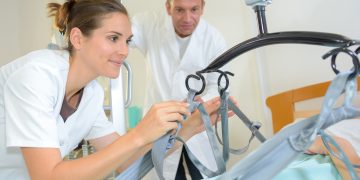Family nurse practitioners play an essential role in the American healthcare system. They are tasked with providing primary care services to individuals of all ages and backgrounds. Right now, there is more demand than ever for medical professionals who can provide this level of medical care.
To truly understand the demand for healthcare workers, one must also consider the fact that some of these aging adults are also healthcare workers. As older workers retire, there will be many opportunities for those with good training, skills, education and experience.
What do nurse practitioners do?
Becoming a nurse practitioner allows you to legally take on duties that are often performed by a medical doctor. Instead of being in a primary caregiving role, you will spend a lot of time on some of the following tasks.
Diagnosing conditions
A nurse practitioner can diagnose many common complaints and illnesses in just a single appointment. Of course, there are limitations to which diagnostic tools and tests are available at any medical facility, so testing and some treatments may be done by an outside laboratory or specialist.
Referrals
In the world of medicine, it is common to have a network of trusted specialists and colleagues you can refer patients to when necessary. For example, some general nurse practitioners may choose not to offer total prenatal care or care for high-risk pregnancies. Instead, they will refer a patient to an obstetrician for further pregnancy-related care.
Treatment for cancer is another example where specialists are always used. A nurse practitioner may refer a patient for testing at a cancer center to confirm without a doubt that a patient has the condition and collaborate with specialists to form a treatment plan and ensure the patient follows it.
Patient testing
Nurse practitioners may order medical tests and have the initial sample collected at their office. An assistant might collect the sample, or the practitioner may do it themselves depending on staffing and scheduling needs.
Some medical facilities have labs in house, while others send samples to outside laboratories for analysis. Nurse practitioners may also refer patients to specialists for further testing if there is reason to think the patient may be suffering from a specific problem. For example, if a nurse practitioner finds a lump in a patient’s breast, they would send them to a specialist for a mammogram or biopsy to determine if it is benign or cancerous.
Treatment plans
Regular nurses typically do not create treatment plans for patients, but nurse practitioners do this every day. Treatment plans may include working with specialists for some steps, such as major treatments and surgeries. Many medical professionals are well aware of the value of holistic practices in creating treatment plans. A nurse practitioner may advise patients to include activities such as yoga, meditation, and outdoor exercise like hiking. Spiritual wellness is often encouraged if spirituality is found to be important to a patient.
Nurse practitioners must be skilled at creating the treatment plans that are most likely to work for a specific patient. This means they must ask questions to gain an accurate idea of a patient’s lifestyle, limitations, thoughts and wishes regarding treatments. There is a lot to consider in creating a treatment plan that a patient will likely follow. For example, if it is clear that a patient is not going to make a major effort to lose weight by exercising, an emphasis on healthy eating habits might be more effective.
Medical teams also have to consider that some treatment options may not be realistic due to a patient’s religious beliefs. Blood transfusions during surgery are an excellent example of a practice prohibited by some religions. This means that a doctor may have to advise a patient that surgery may not be a good option for them and recommend a different and possibly less effective treatment option.
Prescribing medications
Nurse practitioners are allowed to prescribe medications, unlike a regular RN. If you have a common and easily treatable condition, you may be seen by a nurse practitioner rather than a doctor when you are seen at some medical practices. The ability to prescribe medications is one of the many ways that having a nurse practitioner working in conjunction with medical doctors can allow a facility to see more patients without reducing the quality of care.
A nurse practitioner may see a patient regularly to assess whether their medication is doing its job or if the dosage needs to be adjusted. Over the course of managing a condition or treating it, a nurse practitioner may add additional medications or even switch to a different medication if the patient’s condition changes.
Recording medical history and updating patient records
Keeping an accurate record of a patient’s health and medical history is important for providing a high level of care now and in the future. Knowing a patient’s medical history provides valuable insight that can help diagnose specific problems faster and with a higher level of accuracy.
Making sure that all patient information is entered immediately and that nothing is left out is also very important. Good record-keeping prevents misunderstandings and medical errors that may impact a patient’s health.
Since good medical facilities often attract patients and retain them for many years, having a good record-keeping system allows medical professionals to know their patients well. Even when a new team member joins, they can access the backlog of medical information and offer the highest level of care possible to the patient without asking them unnecessary or repetitive questions.
Performing some basic medical procedures
While surgeries and other major procedures are limited to specialized facilities and hospitals, nurse practitioners do perform or assist in treating cuts and lacerations, setting some broken bones and applying casts or splints, or treating sprains or minor dislocations.
At larger medical facilities, a nurse practitioner may assist with more tasks if needed during periods of high demand or staff shortages.
Physical exams
Everyone should have a complete physical exam at regular intervals. How often a complete physical exam is recommended can vary based on a patient’s age and pre-existing medical conditions. A yearly exam is the most common recommendation. A complete physical allows nurse practitioners to assess a patient’s general health and catch some problems before they progress further. A yearly exam can prevent health problems from becoming more serious and leading to more invasive and expensive treatment options.
Sports physicals and those required to attend school are often completed by nurse practitioners as well. These exams are practically identical to a regular yearly exam, but there may be more of an emphasis on making sure that a patient is not experiencing any physical symptoms that would be exacerbated by a very high level of physical activity or impact sports.
Preventative care
The medical community and insurance companies are placing a greater emphasis on preventative care than ever before. During the COVID-19 pandemic, many people stopped going to the doctor for preventative care. At best, some basic check-in appointments may have occurred via telemedicine. While telemedicine is a great tool, there are some things that simply have to be done in person. A routine physical is a good example of preventative medicine that many people overlook.
Family nurse practitioners encourage patients to keep up with preventative medicine by explaining what is needed and how it will benefit them. Since so many people are used to avoiding any medical appointments that are not related to a problem they are currently suffering from, it is important for family nurse practitioners to explain how preventative care can actually lead to fewer doctors’ visits over time and reduce the likelihood that they will have a medical issue become serious before it is noticed.
Some patients may not realize that preventative visits are covered by their health insurance, so this may be a factor if they are reluctant to make preventative care appointments.
FNPs can specialize
Like many medical professions, an FNP can specialize in a specific area of medicine they are most passionate about. For example, those who prefer to work with younger patients might specialize in pediatrics or neonatal medicine.
Other specializations may include mental or psychiatric care. There is a very high demand for nurse practitioners who are skilled in dealing with substance abuse and mental health issues. Unfortunately, there has been a major rise in substance abuse rates post-COVID-19. A family nurse practitioner may need to recommend rehabilitation treatment or prescribe medications that can help patients overcome substance abuse and deal with any residual mental health issues.
How to start a career as a family nurse practitioner
Family nurse practitioners start their medical careers as registered nurses (RN). This means you typically need to have a bachelor’s degree in nursing and two or more years of experience as an RN before pursuing a Family Nurse Practitioner degree.
Are there any shortcuts I can take to become an FNP sooner?
Patients need family nurse practitioners who have a high level of experience and skills. All FNP programs require that you hold an active RN license. Nevertheless, there are online degree programs that allow you to earn a Bachelor’s degree in nursing at an accelerated speed if you already have a bachelor’s degree in another discipline.
If you have a degree that is science-based, there may be some very fast degree options that will allow you to get started working as an RN quickly so you can gain the experience you need to begin classes to become an FNP.
You may wonder where do family nurse practitioners work? The answer is that they work in many different settings. Texas Woman’s University offers an excellent online program that will prepare graduates for any working environment. While a lot of FNPs work at private medical practices, urgent care centers and hospitals, there are plenty who work in schools and university health centers. Correctional facilities also employ FNPs for routine inmate healthcare.
It is possible for an FNP to start a private practice as well. In most cases, people choose to work at a facility with others and gain experience before starting their own private practice. It is important to find out whether there is significant demand for primary care providers in the area you are considering starting your practice. A region that has a major shortage of providers may provide a lucrative opportunity to get started on your own.
Always check with state laws where you wish to practice for guidelines on what an FNP is allowed to do. There are some states where you must operate under a medical professional such as an MD, thereby eliminating the option of starting a private practice on your own.
Do FNPs earn a much higher salary than RNs?
Like any job, the more education and experience you have, the more you can expect to earn. Of course, it is important to remember that an FNP has more duties than an RN. The average salary of an FNP in the USA is around $121,000, according to Salary.com, compared to $85,000 for an RN. It is important to remember that RN salaries can vary greatly based on your experience level and any specializations or other credentials you possess.
Useful skills for those who want to be an FNP
While RNs need to have a lot of the same skills as an FNP, there are some differences.
FNPs are more involved with their patients
As an RN, you are in charge of administering some treatments and conducting caregiving, but as an FNP, you will often have to make a diagnosis. This means you need to have excellent listening skills and pay a lot of attention to detail when patients are talking to you.
FNPs must be willing to collaborate often with other medical teams
FNPs work with a lot of different people and facilities to provide a high level of care. Although RNs also have to work on a team, FNPs tend to work with even more people and organizations. This requires networking and discovering specialists and medical facilities that you can honestly recommend to your patients with a high degree of confidence.
FNPs need to have good cultural awareness and work well with a diverse population
Many areas are becoming very diverse. This means it is important to do whatever you can to learn about different cultures and people. Providing a high level of care to everyone is possible with some research or training to understand others.
Taking the time to learn about other people also increases the likelihood that they will be comfortable at your medical facility and recommend it to others.
Good cultural awareness encourages those from different ethnic and religious backgrounds to seek preventative care rather than waiting until a problem is more serious.
Taking the time to learn a second language can help a lot if you live in an area where much of the population speaks it. In the United States, learning to speak Spanish is extremely helpful when working in the medical community. In fact, it can make a major difference in how well your job application is received for some positions.
Conclusion
The demand for family nurse practitioners is strong. It is an excellent next step for nurses with at least two years of experience working as an RN at a medical practice or hospital. If you are a mid-career nurse, it is worth considering pursuing an advanced degree while you continue gaining RN experience.
Over the years, there will continue to be an increased demand for primary care providers throughout the country. It is a great time to get started on a career path that is emotionally and financially rewarding, with excellent job security and opportunities for promotion or even starting your own private practice.
Family nurse practitioners help people learn the importance of preventative care when it comes to long-term health and well-being. With so many people developing chronic conditions at some point in their life due to the combination of living longer and certain environmental or lifestyle-related choices, preventative care is more important than ever.

























